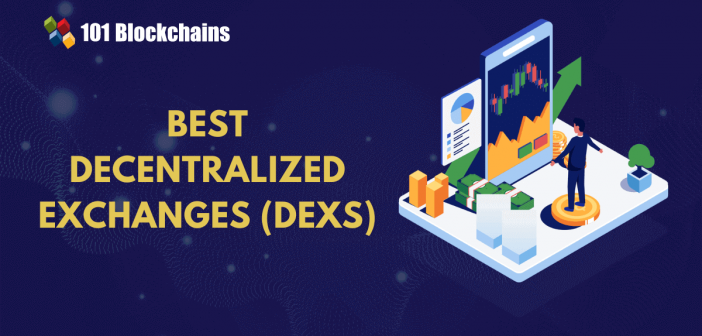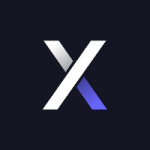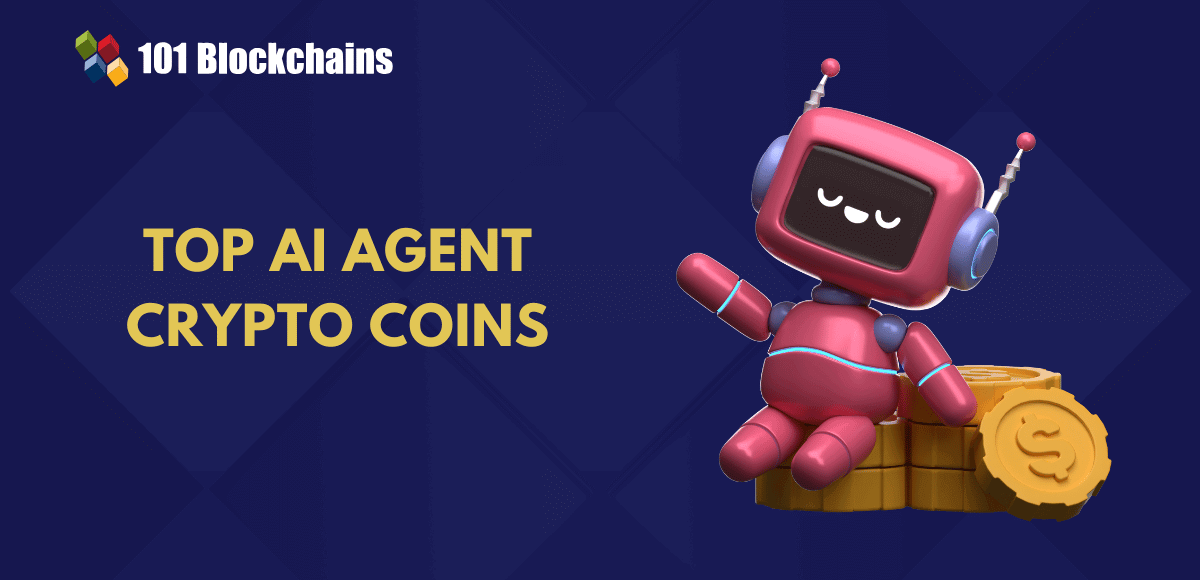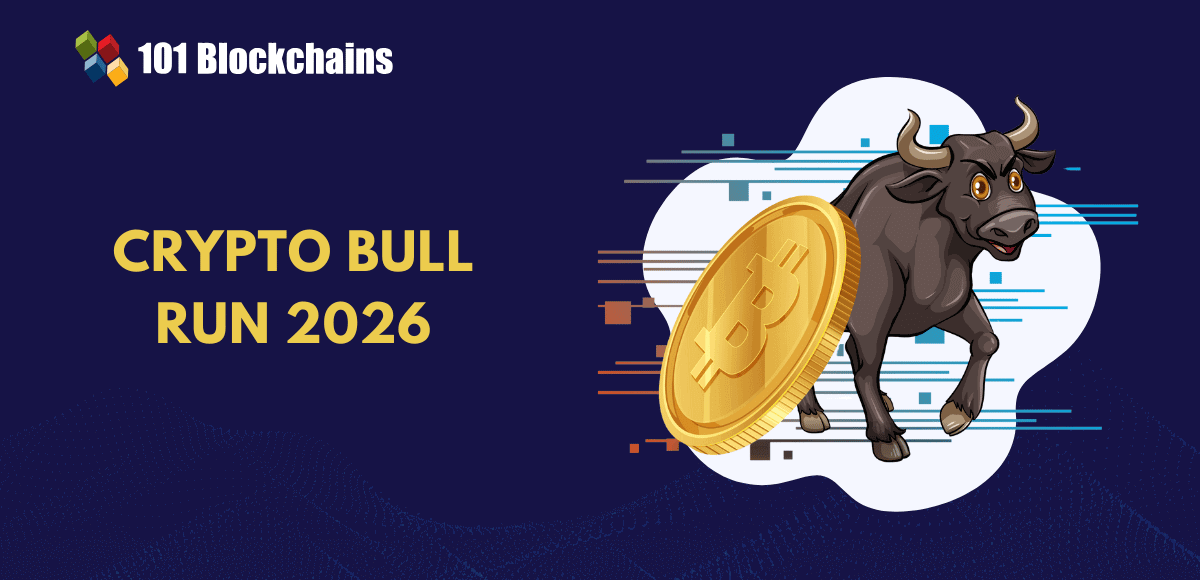Build your identity as a certified blockchain expert with 101 Blockchains’ Blockchain Certifications designed to provide enhanced career prospects.

- Cryptocurrency
Georgia Weston
- on December 14, 2025
List of Best Decentralized Exchanges (DEXs) 2026
Cryptocurrency exchanges are the biggest tools used in the crypto industry at the moment. The first crypto exchange was created in 2010, and then many others made their entry into the market, improving the accessibility of cryptocurrencies. However, centralized exchanges have posed significant limitations that restrict the potential for large-scale usage. Therefore, the best decentralized exchanges have emerged as helpful alternatives for crypto traders.
The examples of centralized crypto exchanges such as FTX set the wrong precedent for crypto users. On top of it, the frequent complaints about downtime on popular crypto exchanges such as Coinbase also showcase the crypto industry in bad light. Let us find out how decentralized exchanges solve the problems found in centralized exchanges and a list of popular decentralized exchanges you should try in 2026.
Build your identity as a certified blockchain expert with 101 Blockchains’ Blockchain Certifications designed to provide enhanced career prospects.
How Does a Decentralized Exchange Work?
You can compare the different entries in a list of decentralized exchanges with an enhanced understanding of their working mechanism. Decentralized exchanges, or DEXs, are peer-to-peer marketplaces that remove the single points of failure evident in centralization. As a result, they help take away most of the risks associated with centralized exchanges.
Aren’t they meant to be the perfect solutions to problems with centralized exchanges? Do DEXs address only the risk of single points of failure? The first generation of DEXs aimed at replicating the user experience of centralized exchanges and used order books. However, such types of decentralized exchanges presented difficulties in usability and were expensive and inefficient.
The reputation of decentralized exchanges improved when Automated Market Makers or AMMs were introduced in DEX design. Most of the top decentralized exchanges use AMMs, which are smart contracts that can automatically set the price of crypto assets on the basis of supply and demand.
The new decentralized exchanges could allow anyone to swap tokens in a trustless environment and lock their tokens in liquidity pools. AMM smart contracts are responsible for establishing the exchange rate and the rewards for liquidity providers. At the same time, AMMs also offer an intuitive user experience in decentralized exchanges.
-
1Inch

It works by finding the best prices by comparing liquidity across different decentralized exchanges. Crypto investors can rely on 1Inch for freedom from transaction or withdrawal fees. On top of it, 1Inch offers support for different crypto wallets, thereby ensuring better accessibility to the crypto space.
Want to get an in-depth understanding of crypto fundamentals, trading and investing strategies? Enroll now in the Crypto Fundamentals, Trading And Investing Course
-
dYdX

Therefore, it is a better alternative than simple AMMs. dYdX is a promising addition to the most popular decentralized exchanges, and it combines multiple features in one package. It offers a user-friendly interface, deep liquidity, and advantages of low fees.
-
Uniswap

On top of that, Uniswap is the first decentralized exchange in the world to offer flexibility for trading ERC20 tokens. Uniswap also has its native token, UNI, which allows the owners to provide liquidity to the exchange and earn rewards. However, it has some limitations, such as offering support only for EVM-compatible crypto tokens.
-
PancakeSwap

Users can also stake the native tokens on PancakeSwap to earn rewards alongside capitalizing on the flexibility for yield farming. Most important of all, it offers faster transactions than Uniswap and a bevy of user-friendly features, making it a top DEX.
-
Curve Finance

On the other hand, the optimization of Curve Finance for stablecoin trading makes it the best pick for low-slippage rates. Another impressive feature of Curve Finance is the support for multiple blockchains alongside better efficiency for larger transactions.
-
Balancer

Balancer is the ideal decentralized exchange for anyone who wants to manage a diverse portfolio of crypto assets. Balancer also caters to the needs of traders seeking advanced strategies to offer liquidity. The diverse asset exposure opens up the prospects for landing compounded returns.
-
SushiSwap

However, it has developed its own unique identity with diverse features for users and a special theme for branding its user experience. SushiSwap users can swap assets and offer liquidity alongside borrowing and lending assets. It also follows the lines of decentralized exchanges that offer the privilege of participating in the governance of the protocol.
-
Orca

On top of that, Orca has proved to be the best pick for traders who prefer anonymity. Users can also capitalize on the advantage of trading directly from wallets and reducing the risk of losing funds to hacking or third-party mismanagement.
Enroll now in the Solana Development Course to understand the workings of the Anchor framework, Solana Program Library, and Solana tokens.
-
Vertex

Vertex went through major changes in its overall structure and goals. One of the most interesting features of Vertex is the option for bridging to 8 different blockchains, which ensures interoperability. In addition, it also offers faster order-matching mechanisms that can improve efficiency of crypto transactions.
-
Apex Protocol

Another unique highlight of the Apex protocol is the Starkware layer 2 scalability mechanism that also addresses security concerns. As a matter of fact, Apex protocol has gained popularity for offering improved privacy and security features.
How Can You Choose the Right DEXs?
As you can notice, there are multiple decentralized exchanges in the market with innovative features. Therefore, it is important to differentiate between the best-decentralized exchanges to find the ideal choice for your requirements. Interestingly, a few factors can help you choose the best DEX according to your needs.
First of all, you must check the blockchains on which the decentralized exchange operates, as it would dictate the level of interoperability. Another important criterion for evaluating a decentralized exchange is liquidity. Without sufficient liquidity, traders might have to face the negative consequences of slippage.
You must also evaluate a decentralized exchange on the basis of whether it is open or permissioned. For example, certain DEXs only allow the community members to add new liquidity pools. Most importantly, you can compare the best DEXs on the basis of their security features.
Start learning Blockchain with world’s first Blockchain Skill Paths with quality resources tailored by industry experts Now!
Final Words
The growing popularity of decentralized exchanges has become a major highlight in the crypto space. They are more efficient, secure, and faster than centralized exchanges. Most important of all, the continuously expanding list of decentralized exchanges brings new options for staking and yield farming.
DEXs such as Uniswap, PancakeSwap, SushiSwap, 1Inch, and Vertex serve as the big players in the market. As the demand for decentralized exchanges continues to grow, the number might go beyond hundreds into thousands. Learn more about the working mechanism of decentralized exchanges and best practices to use them right now.
*Disclaimer: The article should not be taken as, and is not intended to provide any investment advice. Claims made in this article do not constitute investment advice and should not be taken as such. 101 Blockchains shall not be responsible for any loss sustained by any person who relies on this article. Do your own research!






